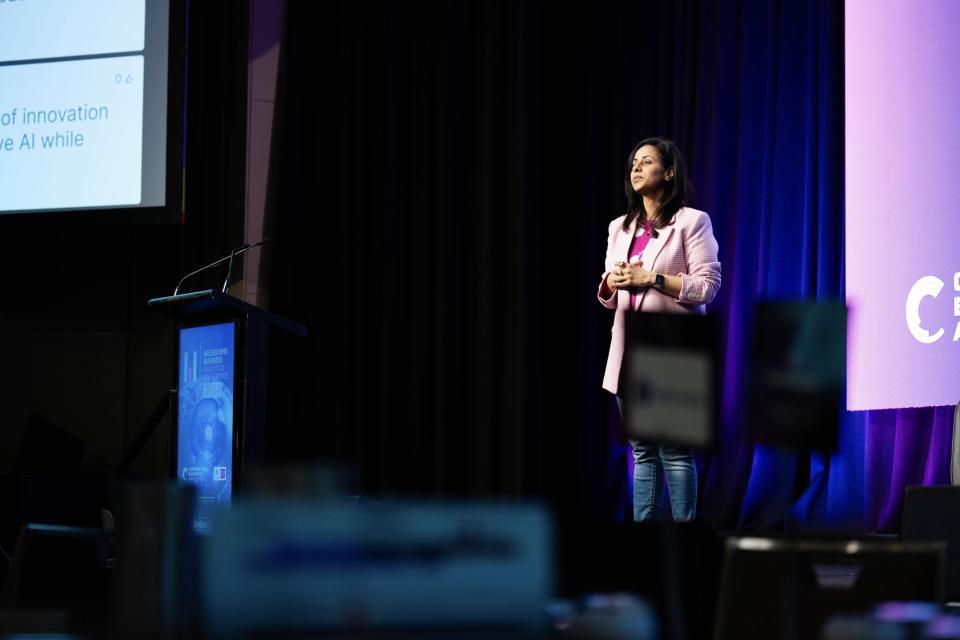California Business School Deans Explore Management Education in Age of AI
UC Davis GSM hosts 30+ leaders of the state's business schools
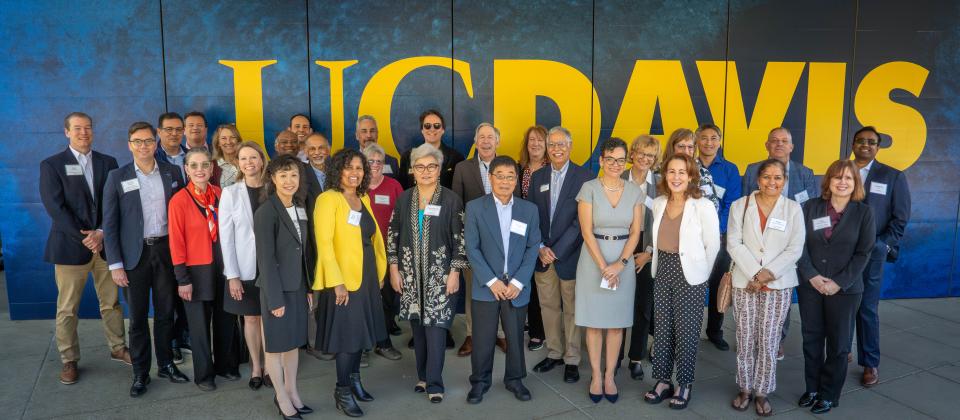
The explosion of the use of artificial intelligence was literally and figuratively top of mind at the fifth annual California Business Schools Deans' Conference hosted by the UC Davis Graduate School of Management on March 25, 2025.
More than 30 deans and top leaders from business schools of all sizes—public and private, big and small—from across the state gathered at Davis for a day-long immersion of roundtable discussions, demonstrations and informative presentations focused on AI-driven transformation in business education.
“We’re talking about how AI is going to change education, how business schools can serve society, and how we should understand the modalities that people are now asking for in education,” said H. Rao Unnava, the Michael and Joelle Hurlston Dean at the UC Davis Graduate School of Management, after welcoming the group of peers representing about 20 business schools.
California, with the equivalent of the world’s fifth largest economy, is home to 41 AACSB International accredited business schools, second in number only to New York with 42, among the 554 in the U.S. That makes California business schools some of the most influential institutions that are driving innovation in higher education.
AI: Adapt or Die
That was the stark morning wake up call to attendees delivered by Distinguished Professor Hemant Bhargava, a leading expert in AI and technology platform economics.
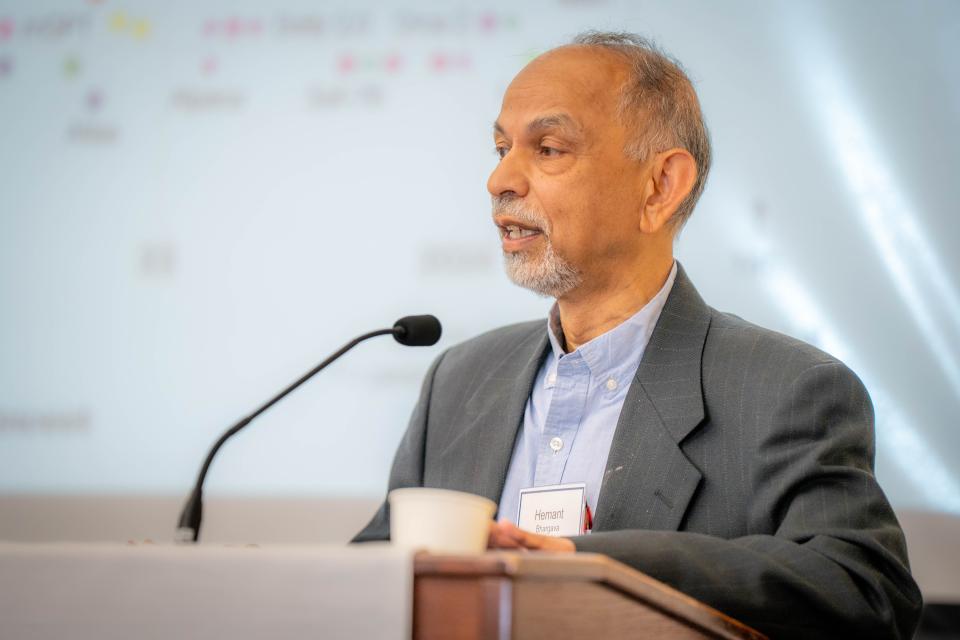
Bhargava warned about the limitations of AI and that research has shown that some AI “solutions” are more likened to snake oil.
“AI is not perfect: Use of AI must be strategic and monitored,” said Bhargava, the Jerome and Elsie Suran Chair in Technology Management and director of the Center for Analytics and Technology in Society at UC Davis. “Take AI for what it currently is: models that can understand inputs in natural language and produce outputs based on the data they’ve been trained on.”
Bhargava also made the case that the current business school model of teaching and research is being upended. He called for a new business model opportunity based on a triad of teaching, more relevant and applied research and an AI clinic, all connected to industry.
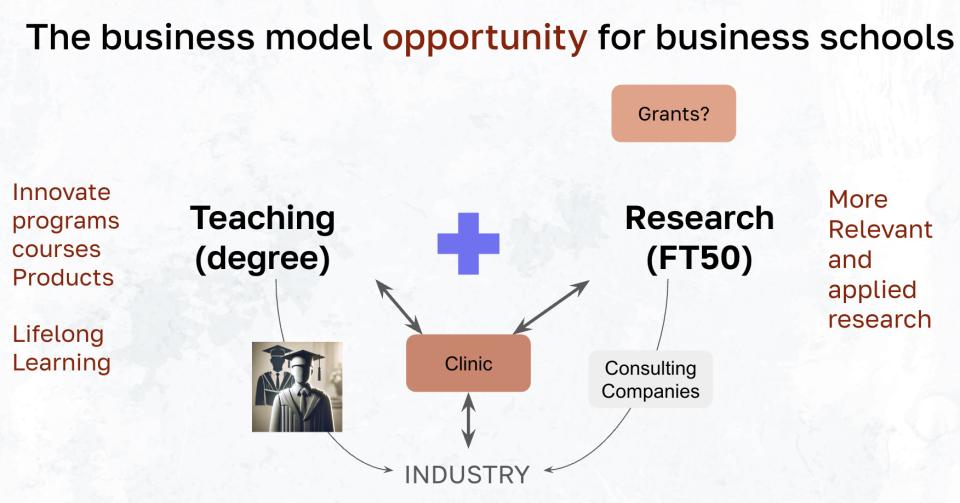
“AI will replace some jobs, but history shows new roles emerge,” Bhargava predicted. “Companies that embrace AI can scale and grow, creating more opportunities. Take software—AI can generate code, but we still need programmers. We do more with software now because it's cheaper and faster. The key is to adapt and elevate human roles.”
Adapting and elevating human roles became the topic de jure for the remainder of the conference.
Integrating AI
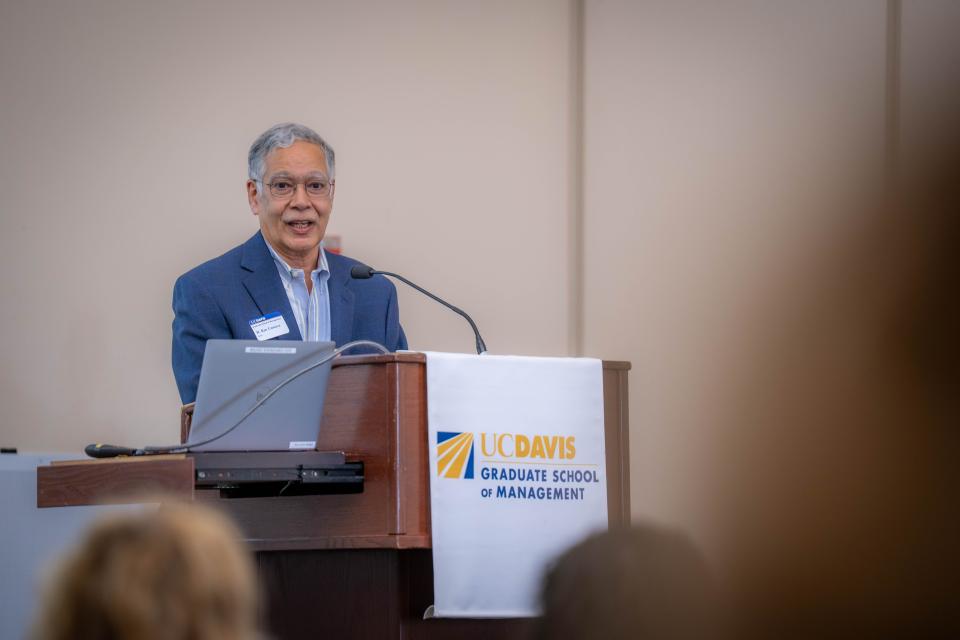
To demonstrate the latest abilities and creative uses of relatively low-cost AI tools for developing content and potential curriculum, Truedge AI Founder Roger Lloyd showed in real-time how to leverage ChatGPT 4.0 output such as a blog or business topic, upload that content to Google NotebookLM to create a podcast, and convert the podcast to video with NVideo.
The title of Lloyd’s talk, “From Creative Thinking to AI Platform, Stacking: A Framework to Integrate into Business School Curriculum,” struck a chord.
“Right now, the biggest impact on business school education is how we integrate AI into coursework and prepare future business leaders. This is a major topic today, and I will bring these insights back to my school,” said Lisa Ordóñez, dean of the UC San Diego Rady School of Management.
“Everyone here is smart, but we’re smarter together. Sharing what’s happening at different schools sparks new ideas,” Ordóñez said. “Unlike corporate America, academia thrives on collaboration. This ensures all California schools serve their students well. We want students ready to use AI from day one.”
Dayle Smith, dean of Loyola Marymount University’s College of Business Administration, said business schools have to be first movers on AI.
“I think some of the key takeaways are the fact that AI isn’t something that we have to necessarily manage, but something we have to embrace,” Smith said.
“Yes, the ethical use of AI is important, but at the end of the day, we're preparing a generation of business leaders who have to learn how to use the tools, evaluate their effectiveness in solving problems, discuss AI use with others, and understand how it can lead to productive outcomes for an organization.”
— Dayle Smith, dean of Loyola Marymount University’s College of Business Administration
California B-Schools Brethren
Antonio (Tony) Bernardo, dean and John E. Anderson Chair in Management at the UCLA Anderson School of Management, said they are embracing AI tools to augment students’ natural creativity and ability.
He said he flew up from Los Angeles for the day because California schools face many similar challenges such as funding and international student recruitment so there’s a need to connect and share information with each other.
“It helps us be better deans. And if we're better deans, we produce better experiences for our students and faculty,” he said. “Things are moving so quickly in the business school environment that there's no way any one of us, without the help of a wide network of experts, would be able to stay on top of all of these changes. And that's why we're here.”
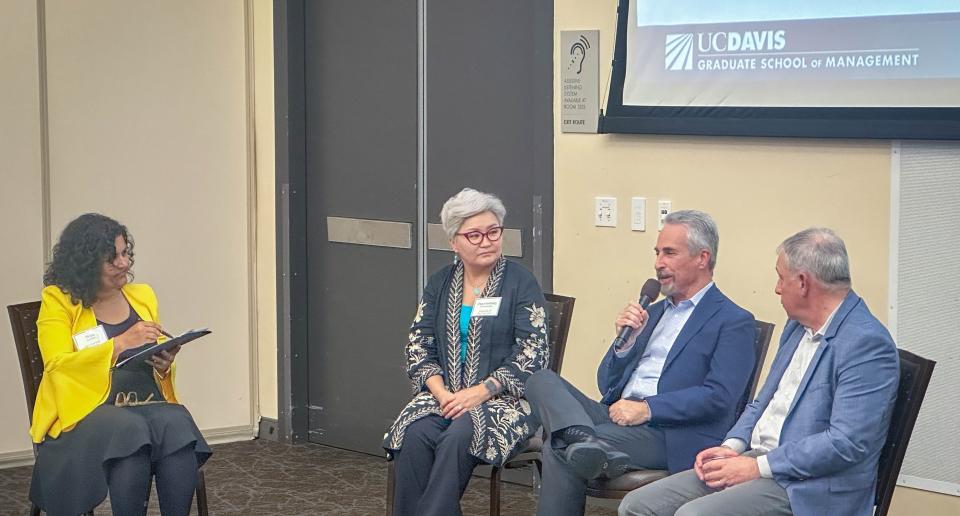
Bernardo served as a panelist, joining Dan Mashavi, the Thomas Evelyn Page Dean at the San Diego State University Fowler College of Business, and Otgontsetseg Erhemjamts, dean of the University of San Francisco School of Management. The panel, “Curricular, Modality, or Other Innovations Attracting Students at Undergraduate and Graduate or Executive Levels,” was moderated by Rangapriya (Priya) Kannan, dean of San José State University’s Lucas College and Graduate School of Business.
Asked by Kannan about what keeps them up at night, San Diego State’s Mashavi said he’s concerned about higher education’s ability to train the workforce on AI. “Corporate America can do a better job than higher ed and at five times the speed.”
Otgontsetseg said she was worried more about alternative higher education business models such as Minerva University, which is an independent non-profit offering an immersive global experience.
Bernardo of UCLA said business schools will need to focus even more on developing student’s leadership skills that empower them to be “catalytic in an organization.”
He added that despite the series of serious “body blows” that higher education has endured recently, universities and business schools are essential and create immense value for society.
“We educate, we create opportunity, and we advance knowledge for the good of the public. We should be incredibly proud of that,” UCLA's Tony Bernardo said to a round of applause.
International Student Enrollment Challenge
Where the rubber hits the road for most deans in the room is student enrollments—and international students bring valuable perspective and diverse backgrounds to the classroom.
With talk of the Optional Practical Training (OPT) for international graduates being eliminated, H1B visa being limited to those whose talents are needed for the country, and applications for H1B by companies being scrutinized more rigorously, these factors have led to international students expressing reservations about coming to the U.S. for graduate business education.
As the closing group debrief, this question was posed: What are some steps we can take as deans of California Business Schools to address the potential drop in international enrollments in our programs?
“There's just a lot of uncertainty for an international student considering studying business in the U.S.,” said Bernardo of UCLA. “That's a challenge all graduate programs in particular face. Many undergraduate programs rely heavily on California students, but our graduate programs depend significantly on international students. That environment is changing quickly, and I think that’s a concern for all of us.”
